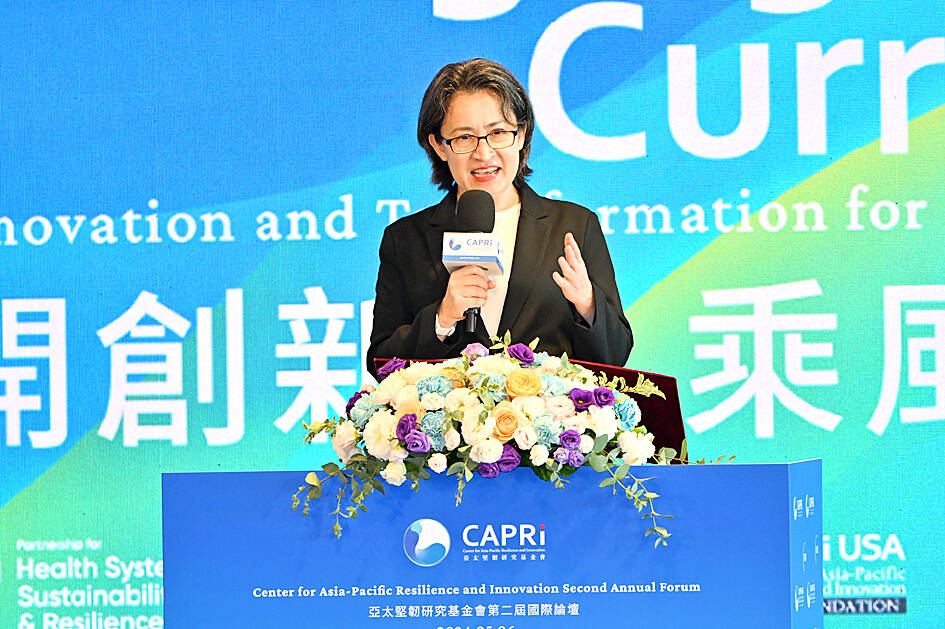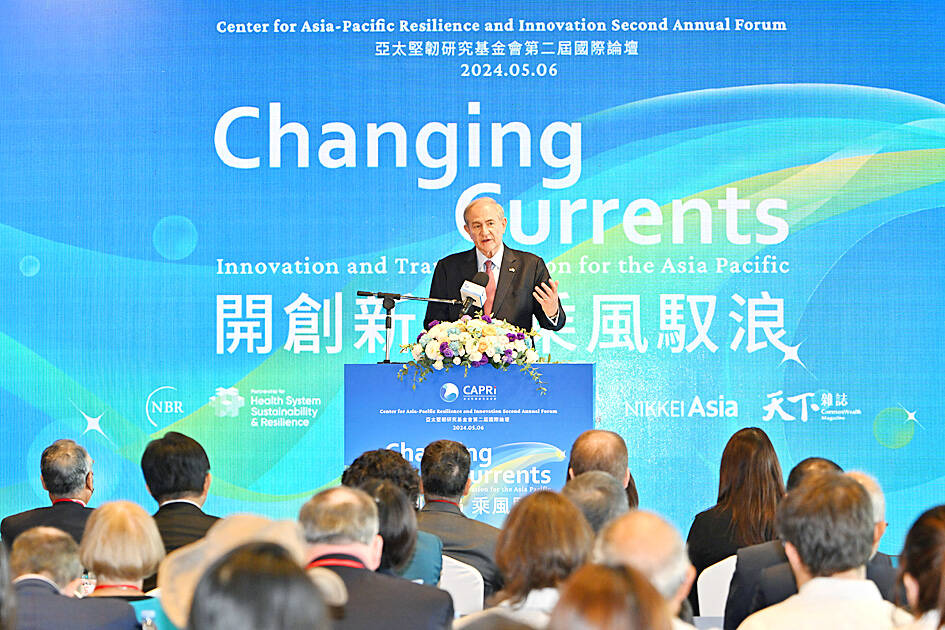Taiwan can play a leadership role in the Asia-Pacific region, vice president-elect Hsiao Bi-khim (蕭美琴) told a forum in Taipei yesterday, highlighting the nation’s resilience in the face of geopolitical challenges.
“Not only can Taiwan help, but Taiwan can lead ... not only can Taiwan play a leadership role, but Taiwan’s leadership is important to the world,” Hsiao told the annual forum hosted by the Center for Asia-Pacific Resilience and Innovation think tank.
Hsiao thanked Taiwan’s international friends for their long-term support, citing the example of US President Joe Biden last month signing into law a bill to provide aid to Taiwan, Ukraine and Israel.

Photo: Tien Yu-hua, Taipei Times
The nation’s own efforts in strengthening itself are also of great importance, Hsiao said.
“We must have the confidence that Taiwan is worthy of galvanizing international support,” she said.
Taiwan has demonstrated its economic, social, democratic and defense resilience in the face of natural disasters, limited natural resources, the martial law era, diplomatic isolation, cyberattacks, disinformation, political interference and near-daily military incursions, she said.

Photo: Tien Yu-hua, Taipei Times
“Against all these odds and long overshadowed by our larger neighbors, Taiwan’s remarkable story of perseverance and determination has propelled it onto the world stage,” she said.
Taiwan has been a model in the Asia-Pacific region with its democratic transition, regularly held free and fair elections, and an open society that has become home to a growing number of international non-governmental organizations, think tanks and media organizations, Hsiao said.
The progress the nation made in universal healthcare accessibility, gender equality and LGBTQ rights are also inspiring neighboring nations, she added.
Through humanitarian assistance and charity programs, “Taiwan has managed to lead in our soft power as a force for good extending the influence of kindness and humanity across the region,” she said.
On the economic front, Taiwan boasts high-tech innovation and a thriving ecosystem largely driven by small and medium-sized enterprises, she said.
Hsiao said she and president-elect William Lai (賴清德) “are committed to leveraging these assets as we work to forge stronger partnerships with like-minded societies around the world.”
At the same forum, former Virginia governor James Gilmore expressed the US’ determination to cooperate with allies around the world in its leadership.
“America is stronger, our country is stronger ... when we work with other people,” Gilmore said.
The US has a stake in the Asia-Pacific region and has to consider the impacts of its actions on other nations, including Taiwan, said Gilmore, who was also former US president Donald Trump’s ambassador to the Organization for Security and Co-operation in Europe.
“Taiwan is our friend, and we have a stake in the success and strength and friendship of Taiwan,” he said.

The CIA has a message for Chinese government officials worried about their place in Chinese President Xi Jinping’s (習近平) government: Come work with us. The agency released two Mandarin-language videos on social media on Thursday inviting disgruntled officials to contact the CIA. The recruitment videos posted on YouTube and X racked up more than 5 million views combined in their first day. The outreach comes as CIA Director John Ratcliffe has vowed to boost the agency’s use of intelligence from human sources and its focus on China, which has recently targeted US officials with its own espionage operations. The videos are “aimed at

STEADFAST FRIEND: The bills encourage increased Taiwan-US engagement and address China’s distortion of UN Resolution 2758 to isolate Taiwan internationally The Presidential Office yesterday thanked the US House of Representatives for unanimously passing two Taiwan-related bills highlighting its solid support for Taiwan’s democracy and global participation, and for deepening bilateral relations. One of the bills, the Taiwan Assurance Implementation Act, requires the US Department of State to periodically review its guidelines for engagement with Taiwan, and report to the US Congress on the guidelines and plans to lift self-imposed limitations on US-Taiwan engagement. The other bill is the Taiwan International Solidarity Act, which clarifies that UN Resolution 2758 does not address the issue of the representation of Taiwan or its people in

US Indo-Pacific Commander Admiral Samuel Paparo on Friday expressed concern over the rate at which China is diversifying its military exercises, the Financial Times (FT) reported on Saturday. “The rates of change on the depth and breadth of their exercises is the one non-linear effect that I’ve seen in the last year that wakes me up at night or keeps me up at night,” Paparo was quoted by FT as saying while attending the annual Sedona Forum at the McCain Institute in Arizona. Paparo also expressed concern over the speed with which China was expanding its military. While the US

SHIFT: Taiwan’s better-than-expected first-quarter GDP and signs of weakness in the US have driven global capital back to emerging markets, the central bank head said The central bank yesterday blamed market speculation for the steep rise in the local currency, and urged exporters and financial institutions to stay calm and stop panic sell-offs to avoid hurting their own profitability. The nation’s top monetary policymaker said that it would step in, if necessary, to maintain order and stability in the foreign exchange market. The remarks came as the NT dollar yesterday closed up NT$0.919 to NT$30.145 against the US dollar in Taipei trading, after rising as high as NT$29.59 in intraday trading. The local currency has surged 5.85 percent against the greenback over the past two sessions, central